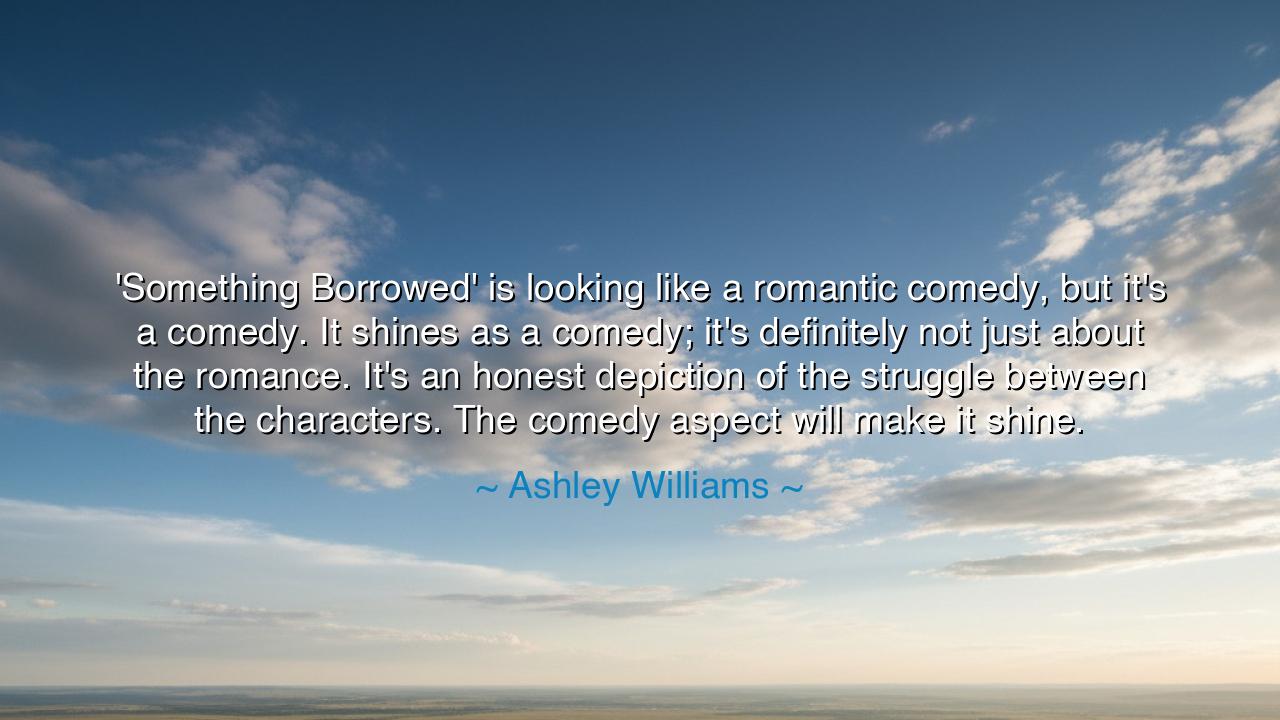
'Something Borrowed' is looking like a romantic comedy, but it's
'Something Borrowed' is looking like a romantic comedy, but it's a comedy. It shines as a comedy; it's definitely not just about the romance. It's an honest depiction of the struggle between the characters. The comedy aspect will make it shine.






In the age-old art of storytelling, few truths are as enduring as the recognition that comedy and romance are not solitary paths but two forces that often dance together. Ashley Williams, in her reflections on the film "Something Borrowed", illuminates this profound truth: a story that is labeled as romantic can, in fact, transcend the boundaries of mere sentimentality and flourish through its comedic essence. It is not simply a tale of hearts in love, but a comedy that reveals the struggles and conflict of the characters in an honest light. It is this struggle—this tension—that makes the comedy shine and lifts the story beyond the ordinary.
The wisdom embedded in Williams’ words brings to mind the ancient Greek plays, where comedy and tragedy were not separate entities but two sides of the same coin. In the works of Aristophanes, the great comedic playwright, humor was not just a tool for entertainment; it was a lens through which the flaws and imperfections of humanity were revealed. Lysistrata, one of his most famous works, is at once an uproarious comedy and a sharp critique of societal and political conflict. The characters in his plays, though often caught in humorous circumstances, were always struggling with deeper themes of human nature, power, and desire. It is in this balance—the combination of light-hearted humor with deep, honest struggle—that a story truly resonates with its audience.
The Roman playwright Plautus, who followed in the footsteps of Aristophanes, understood this principle well. His comedies were filled with misunderstandings, mistaken identities, and romantic entanglements, yet beneath the humor lay the struggles of characters navigating the complexities of life. In the same way, Williams acknowledges that "Something Borrowed" may appear at first glance to be a romantic comedy, but its true brilliance lies in its ability to portray the honest depiction of struggle between its characters. For it is through conflict, whether comedic or otherwise, that characters grow, evolve, and ultimately find resolution. The comedy, in this case, does not detract from the truth of the story; it enhances it.
The power of comedy is not merely to make the audience laugh, but to reveal truths in ways that are both engaging and disarming. Think of the fool in Shakespeare’s works, often the wisest character in the play, despite his role as the source of humor. In King Lear, for example, the Fool’s wit serves as a sharp commentary on the foolishness of the king and the tragic consequences of his actions. Comedy, thus, is a tool of great depth and insight, one that can shine a light on the inner turmoil of the characters while offering the audience the release of laughter.
Williams’ assertion that the comedy aspect of "Something Borrowed" will make it shine is a reminder that laughter has the unique ability to bring us closer to the heart of any story. It is through humor that we can approach complex, uncomfortable truths without feeling burdened by them. Struggle and conflict, after all, are universal elements of the human experience, but it is through humor that we learn to cope, to laugh at the absurdity of life, and ultimately to find redemption. Comedy softens the blows of reality, making it easier to confront the pain, the mistakes, and the imperfections that come with living.
From the stories of ancient playwrights to the modern films we watch today, the lesson remains constant: life is not simply about moments of romance or tragedy, but about how we navigate the tension between them. The romantic comedy, as Williams describes it, is not merely a tale of love—it is a reflection of life itself, full of struggles, missteps, and ultimately, the realization that growth often comes through adversity. To live fully is to embrace both the laughter and the pain, the comedy and the drama. And in doing so, we learn the most profound lesson of all: that joy can arise even in the midst of struggle, and it is through this balance that we find the richness of life.
Therefore, as you move through the various stages of your own story—whether in love, work, or personal growth—remember that the struggles you face are not obstacles to be avoided, but opportunities for growth. Embrace the comedy of life, for it is through humor that you can find the lightness to carry the weight of your burdens. Seek out the laughter in difficult times, for it will be in these moments that you discover the true depth of your journey. Let your story shine as both a comedy and a romance, for in the dance between these two forces, the most beautiful and truthful narratives emerge.






AAdministratorAdministrator
Welcome, honored guests. Please leave a comment, we will respond soon